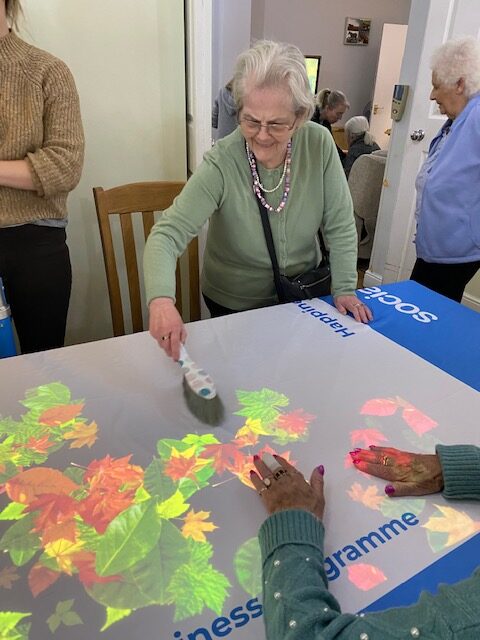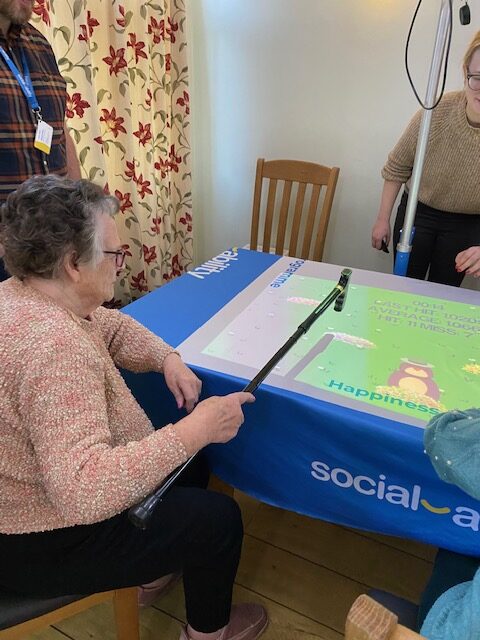Kate Thubron, Dementia Care Specialist from Mindful Care Training and Consultancy, writes about her experience using the Happiness Programme at Coniston House in Felixstowe.




I recently had the privilege of visiting Coniston House, Felixstowe just before Christmas to witness the incredible impact of the Social-Ability Happiness Programme. The care home had asked for a demonstration of the innovative programme to experience and share with their residents and staff.
The Happiness Programme, as featured on the Social-Ability website, employs an interactive activity table that offers a diverse range of engaging experiences. From games like horse riding and snakes and ladders to meditation and dance videos, the residents were captivated and thoroughly enjoyed the project. The interactive light piano also sparked a nostalgic singing session, with residents joining together to melodiously recall songs like “What a Wonderful World” by Louis Armstrong.
Not only does the Happiness Programme cater to different abilities and those living with dementia, but it also creates further opportunities for intergenerational interactions. The feedback was overwhelmingly positive, with everyone impressed by the variety and effectiveness of the activities. Gwen, a resident at Coniston House said ‘I can’t believe we were popping all the paint bubbles with no mess, can you believe that!’
One notable aspect is the adaptability of the project activity table. It can be utilised for group activities or easily transformed to fit individual rooms. Whether placed on a coffee table for a 1-1 interactive activity or projecting sensory, calming visuals onto the ceiling, the table proves beneficial, particularly for residents in end-of-life care.
Apart from bringing joy, technology such as the Happiness Programme could also play a big role in providing people living with dementia Cognitive Stimulation Therapy (CST) opportunities. CST is a recommended therapy for individuals diagnosed with dementia, focusing on group or one-on-one sessions. Although recommended by the NICE Guidelines: (Dementia: assessment, management and support for people living with dementia and their carers) it currently seems to be a postcode lottery on whether this is offered.
CST typically revolves around 14 different sessions with diverse themes, such as childhood, food, faces, and scenes. The Happiness Programme’s activity apps offer an opportunity to seamlessly integrate technology into CST, especially considering the increasing computer and IT literacy of future generations. Using technology not only engages individuals but also provides an avenue for learning and skill development, even for those living with dementia.
The Happiness Programme’s activity apps align with CST principles, stimulating language, fostering new ideas, triggering recall, and focusing on opinions rather than facts. Activities like revealing scenic iconic places worldwide can be tailored to CST sessions, encouraging participants to challenge their brains by identifying locations and engaging in discussions. The opportunities to develop apps too to ensure further CST activities are incorporated is also vast and exciting!
Moreover, incorporating identified apps from the Happiness Programme into care home activities could also reduce the planning time and resources required. The personalised
nature of the Happiness Programme allows for the inclusion of relevant and meaningful pictures, paving the way for future CST activities on the light projector activities board.
Research on Cognitive Stimulation Therapy has demonstrated potential cost savings for the NHS of 54.9 million per year through reduced use of antipsychotic medication (2014). By integrating technology like the Happiness Programme’s interactive projector into care homes, the Happiness Programme could play a significant role in facilitating access to CST, aligning with the growing trend of IT adoption in the healthcare sector.
In conclusion, the Social-Ability Happiness Programme is not just about bringing joy to care home residents; it’s a versatile tool with the potential to help revolutionise dementia care. By seamlessly integrating technology into cognitive stimulation activities, the Happiness Programme opens doors for enhanced engagement, personalised experiences, and cost-effective therapy. The future of dementia care looks brighter with initiatives like the Happiness Programme
If you would like further information and training on Cognitive Stimulation Therapy or any other Dementia care workshops please contact us – Mindful Care Training and Consultancy on info@mindful-care.co.uk and visit our website on www.mindful-care.co.uk.
Mindful Care Training and Consultancy specialises in delivering high-quality services in Dementia Care, Wellbeing, and Mental Health, offering crucial support to the health and social care sector. Our team comprises skilled Allied Health Professionals and Nurses. We take pride in being an official Teepa Snow Positive Approach to Care (PAC) trainer and our lead trainer and consultant Kate Thubron has earned recognition as a National Lead Winner for Dementia Leadership. Operating both in the UK and overseas, we provide comprehensive training and consultancy services. Our commitment is to contribute positively to the field, ensuring excellence in Dementia Care and related areas.
To find out more about the Happiness Programme by Social-Ability then please contact info@social-ability.co.uk and visit their website on www.social-ability.co.uk. Social-Ability run a service called the Happiness Programme, combining our interactive light projector with unlimited training, reporting and support from our team. The interactive light projector is a sensory activity and can be used on any surface like walls, ceilings and the floor, making it inclusive for all to use regardless of dexterity. This means anyone can enjoy it; people living with dementia, people living with learning disabilities, young people in schools and many more. So far, we’ve had incredible care outcomes as a result of our service, for example an increase in social, physical and cognitive wellbeing, a decrease in anti-psychotic medication use and a reduction in distress and anxiety. The Happiness Programme is improving lives every time it is used and we pride ourselves on our genuine care for those who benefit.

Copyright © 2021 Social-ability. All Rights Reserved.